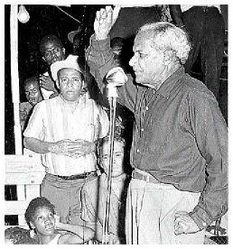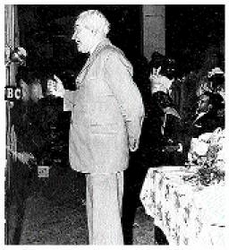A chance for change
Published: Sunday | December 6, 2009


RIGHT: Sir Alexander Bustamante, prime minister and leader of the Jamaica Labour Party, addressing the 18th annual conference of the party at the Ward Theatre in 1962.
Arnold Bertram, Contributor
The labour rebellion of 1938 brought a new breath of freedom to the Jamaican people. Three weeks of militant action transformed their outlook and lifted them to a new sense of their worth and place in society. In the wake of the rebellion, they consolidated the rights they had won and built organisations to advance their interests. It was in this new environment that the campaign for Universal Adult Suffrage (UAS) gathered momentum and became a reality by November 1944.
The Formation of the BITU and the Launching of the PNP
The two most important institutions created by the events of 1938 were the BITU and the PNP. On May 26, 1938, in the heat of the rebellion, 29-year-old Ken Hill moved a resolution which was accepted by the dock workers that they "form themselves into a union headed by Bustamante". The application to register the BITU was signed by Bustamante, the union solicitor, Ross Livingston, and an organiser, L.W. Rose on January 19, 1939.
Three years before, a younger Ken Hill had mooted the idea of organised politics as a vehicle of the emerging national movement at a meeting of the National Reform Association which he founded in 1936. The PNP was formally established at a conference held on August 28, 1938 at the Silver City Club located at Cross Roads in lower St Andrew.
However, it was the activism of O.T. Fairclough which brought together delegates from every parish, as well as from the Kingston and St Andrew Federation of Citizens Associations, the Jamaica Progressive League, the Jamaica Union of Teachers, and from the National Reform Association for the founding conference and the public launch at the Ward Theatre on September 18.
The PNP, through its president, N.W. Manley, would lead the fight for the suffrage, while the BITU would give birth to the JLP and, in so doing, make Bustamante the major beneficiary of the right to vote.
Uncertain Start
Even in this new paradigm, the campaign for the suffrage did not get off to a fast or certain start. The idea that a British colony dominated by people of African descent could be given the right to vote in the absence of access to education and training was far-fetched. In Britain, before the reform of the franchise in 1832, only 237,000 out of a population of 13 million had the right to vote. It took another 96 years before the British people achieved universal adult suffrage in 1928.
Britain's response to the rebellion was to send the West India Royal Commission under the chairmanship of Lord Moyne to examine conditions in the British West Indies. It was the liberal members of this commission who brought the issue of universal adult suffrage to the front burner during the sitting of the commission in Jamaica. It was as a guest of the commission that Norman Manley, after expressing the initial view that a literacy test should be applied for the granting of suffrage, came around to an unqualified endorsement of the immediate granting of the UAS without any conditions. He was the first Jamaican public figure to do so and over the next six years became the most consistent and influential advocate.
Despite Manley's stand, the PNP was by no means united around this issue. O.T. Fairclough, on whose initiative the party was formed, was convinced that the suffrage "would give 'quashee' rights and powers he could not handle and would inevitably condemn the PNP to the wilderness". The following year, Fairclough resigned as secretary of the PNP to take a job as manager of Jamaica's second daily newspaper, The Jamaica Standard.
Two weeks after Manley, on November 24, four elected members of the Legislative Council, led by Harold Allan, confirmed the resistance of the elite to any major expansion of the suffrage as they gave evidence before the Moyne Commission. In response to the proposal to expand the franchise, Allan said he would not recommend any extension of the franchise without an improvement in the education system and was, therefore, not in favour of universal adult suffrage.
Then, on December 14, the Legislative Council, in an about-face, approved a motion by J.A.G. Smith, the most influential member proposing an amendment of the law so as to provide for UAS. The hollowness of the motion was later revealed. A note on the Colonial Office's file spoke to a meeting between J.A.G. Smith and the governor, Sir Arthur Richards, who reminded Smith that the universal suffrage which he had recommended would soon become a reality. Smith's reply was, "But you could never allow that … it would not work and the people are not ready for it." The motion had been passed in response to the observation by the Royal Commissioners that the elected members could hardly claim to be representative of the majority of the people on such a restricted franchise.
Bustamante, the hero of 1938, was even more forthright. In a letter to the secretary of state for the colonies, he declared, "I am the most staunch, the most vigorous, the most consistent and determined opponent to self-government now." Such an outlook on constitutional reform could hardly have come from an advocate of universal adult suffrage.
The Smith Constitution
It was at this stage that J.A.G. Smith attempted once more to determine the parameters of constitutional reform when on June 15, 1939, the elected members of the Legislative Council approved his proposals outlining a new constitution for Jamaica. Nowhere in these proposals was universal adult suffrage discussed since, according to Smith, that had been dealt with in an earlier resolution. He simply recommended that the present limited franchise be adopted temporarily pending the decision of the Colonial Office.
Manley and the PNP repudiated the 'Smith Constitution' on the grounds that it provided only for representative government and not for responsibility by Jamaicans in the administration of their affairs. As far as Manley and the PNP were concerned, the next stage in constitutional reform "should be the immediate vesting of legislative power in the elected element … and the condition precedent for this is full adult suffrage."
Campaign gathers Momentum
After the uncertain start, the campaign for the suffrage gathered momentum. The most important contributing factor was the new spirit of cooperation between the elected members association, the PNP and the Federation of Citizens' Associations particularly after the death of J.A.G. Smith in April 1942. At a meeting between all three groups in May of that year, Manley was asked to draft proposals for joint representations to the British government and, by September, agreement had been reached. On November 5, a memorandum embodying joint proposals for a new constitution, drawn up and signed on behalf of all three parties, was forwarded through the governor to the secretary of state.
Then, with the impending demise of the British Empire during World War II, the president of the United States, F.D. Roosevelt, entered the debate on the future of British colonies in the Caribbean. In discussions with the British, he made it clear that he was "interested in an extension of the franchise … and more self-government for British West Indian colonies". Roosevelt's views were undoubtedly bolstered by the discovery of bauxite in Jamaica in 1942. Walter Rice, who was then vice president of Reynolds Metals, demanded that the United States bring its full weight into securing Jamaican bauxite, since, in his view, "the freedom to mine and ship bauxite from Jamaica to the United States is vitally important to the industrial future of our country and our national security".
Britain Bows
It was in the face of the uncompromising leadership provided by Norman Manley and the increasing pressure brought to bear by the United States of America that Britain finally bowed. In supporting Jamaica's demand for a new constitution and UAS, the Secretary of State, Oliver Stanley, articulated the prudence of Britain accepting the inevitable:
"If we proceed vigorously towards the new constitution, we shall proclaim our good faith to the world, and to the American world in particular … we shall at least appear to give some constitutional advance willingly instead of having it dragged out of us."
Once Universal Adult Suffrage became inevitable, two other political parties were formed to compete with the PNP. The men of property, led by T.H. Sharp and including Abe Issa, Robert Fletcher, Douglas Judah and Gerald Mair, formed the Jamaica Democratic Party in 1942. The following year Bustamante began his preparations to be the major beneficiary of the mass vote. On July 8, 1943, attired in brown shorts, a grey coat and a preacher's white tie, he launched the Jamaica Labour Party at the Ward Theatre.
In May 1944, a draft of the new constitution was published by the Colonial Office. It fell short of what Manley and the PNP had campaigned for, in that it had no provision for an executive council as the chief instrument of policy.
However, an important aspect of the new constitution, which was published in the Jamaica Gazette on November 17 and celebrated in a formal ceremony on November 20, was universal adult suffrage. The long-awaited elections were finally set for December 14, 1944.
Arnold Bertram is a historian, author and former government minister. He may be reached at: redev.atb@gmail.com.







